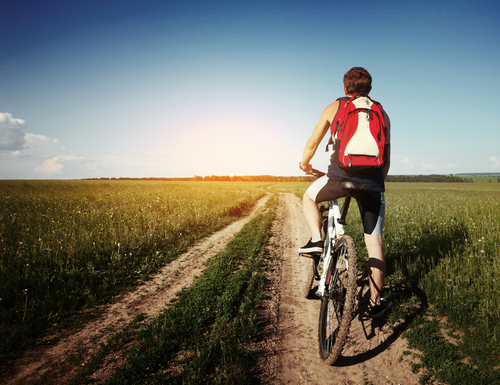Don’t pedal faster than you can daydream

Riding a bike in a city takes concentration. Avoiding pedestrians and cars is rule No. 1. Riding in the country offers other opportunities. You can let your the mind wander, enjoying the freedom of random thoughts as air rushes in and the mind clears. Through fantasy and with creativity, your mind can help you float off to novel places with wonderful results.
All exercise offers gateways to mental floatation. It’s possible for everyone to experience the pheromones, testosterone, endorphins and adrenaline that the body and mind release when going for a run, lifting weights, swimming or practicing yoga. I’m no drug pusher, but these neurotransmitters are transformative and exercise is the key to achieving this ecstasy. So why isn’t everyone smiling?
Because so many have crossed the digital divide and entered the world of the Quantified Self. The end goal of activity was once a natural, post-exercise endorphin glow. Now this has been sidelined in favor of statistics and data. We focus less on how we feel and more on how we measured up to our previous results.
We have become technology junkies, unable to separate ourselves from screens and electronics. We’ve embedded instruments into wristbands, impact sensors into shoes, monitors into bikes and hundreds of blazing TVs into every gym. Devices guide us on exercise programs untailored to our bodies or plug us into a virtual world of unseen and sometimes nonhuman competitors. Devices encourage us to obsess on the shared screens of athletic digital immortality over our times, our calories, our wattage, our weight, our distance and even our REM cycles, never mind our libido.
These are all mindless distractions that keep us from truly absorbing and experiencing the benefit of exercise. Being in tune with your body means that you have balanced the good with bad, the stress with the relaxation, the deficiency with the abundance. What we lose by focusing on cold, hard data is the ability to listen for and tune in to the pitch-perfect tone that our body and mind produces while we exercise.
Our bodies resonate like an acoustic tuning fork, and not just our muscles, but also the vibrations of our mind as they sense the rising sweat of exertion, the pain of muscle strain, the fear of failure and joy of a thumping heart.
My advice is to ditch the digital. Use exercise as a break from screen time. Get in touch with your body without the distraction of a TV or a book. If you avoid the experience by burying yourself in external stimuli, you miss most of the benefit. Don’t always compete and don’t always work out. Try playing. It is fun. The best competitive athletes benefit from training without the pressure of an opponent. Lose yourself in your laughs or in your thoughts and never bike faster than you can daydream.
